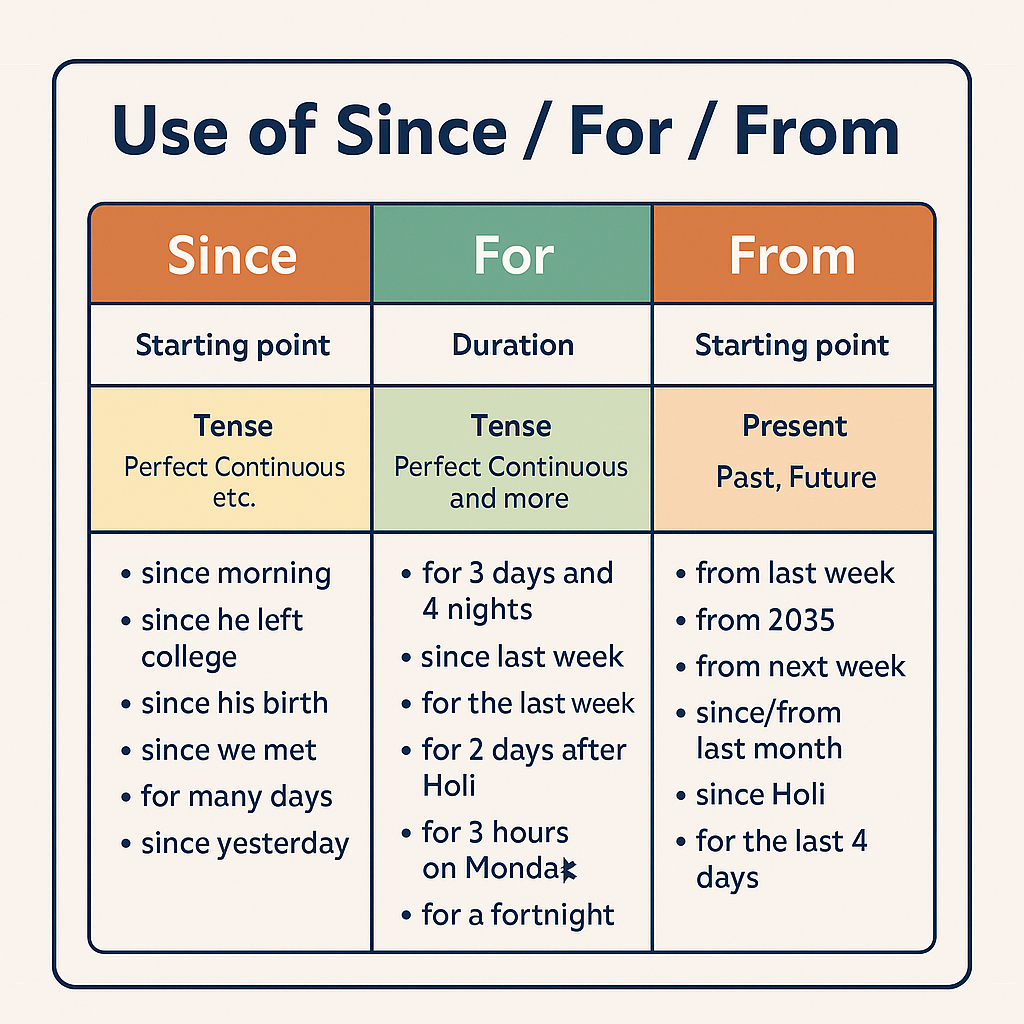Correct Usage of the Present Indefinite Tense (Simple Present Tense)
The Present Indefinite Tense (also called the Simple Present Tense) is primarily used to describe:
1. Daily routines or habitual actions:
It describes actions that happen regularly, habitually, or according to a schedule.
Common time expressions used:
- Always, usually, often, regularly, repeatedly, frequently
- These words typically appear before the main verb.
- Example:
- She usually drinks coffee in the morning.
- They often go for a walk after dinner.
2. Negative frequency expressions:
Words like:
- Rarely, seldom, hardly, barely, scarcely, never
- These are negative in meaning, so we do not use “not” with them.
- They usually come before the main verb.
Examples:
- He never lies. (Not: He does not never lie.)
- They seldom eat out.
3. Time expressions at the end of the sentence:
Words and phrases that denote frequency or regularity are often placed at the end of the sentence:
- Every morning, every night, every week, every Sunday, day in and day out, off and on, now and then, from time to time, once in a while
Examples:
- She goes jogging every morning.
- He calls his parents once in a while.
4. Universal truths, scientific facts, and general truths:
Used for things that are always true — in nature, science, mathematics, philosophy, etc.
Examples:
- The sun rises in the east.
- Water boils at 100°C.
- Death comes to all.
- Honesty is the best policy.
5. Proverbs, sayings, quotations:
Commonly used in literature, essays, and speech writing.
Examples:
- Time and tide wait for none.
- An apple a day keeps the doctor away.
- Actions speak louder than words.
6. Instructions, directions, or commentary (especially in headlines or sports commentary):
- Used when giving instructions or in live commentary.
Examples:
- First, you boil the water.
- Virat Kohli hits the ball for a six!
- Now he enters the courtroom.
7. Scheduled events (especially future events that follow a timetable):
Even though it’s a future action, present indefinite is used to refer to a fixed schedule.
Examples:
- The train leaves at 6 PM.
- My class starts at 9 AM tomorrow.
✅ Usage Rules
| Term | Used To Indicate | Tense Compatibility | Example Tense |
|---|---|---|---|
| Since | Starting point (specific time in the past) | Present Perfect, Past Perfect, Present Perfect Continuous | She has been here since morning. |
| For | Duration (how long) | Present Perfect, Present Perfect Continuous, Past, Future | He has lived here for 5 years. |
| From | Starting point (can be in future or past) | Present, Past, Future (especially future) | We will start from next week. |
🔁 Comparison
| Use Case | Since | For | From |
|---|---|---|---|
| Specific point in time | ✅ | ❌ | ✅ |
| Duration of time | ❌ | ✅ | ❌ |
| Use with perfect tenses | ✅ (commonly) | ✅ (commonly) | ❌ (less common) |
| Use with future tenses | ❌ (rare) | ✅ | ✅ |
📝 Correct Examples
✅ “Since” Examples (starting point):
- Since morning
- Since he left college
- Since we met
- Since his birth
- Since yesterday
- Since last week / last month
- Since Holi
- Since time immemorial
✅ “For” Examples (duration):
- For many days
- For 3 days and 4 nights
- For a fortnight
- For the last 4 days
- For the last 30 years
- For 3 hours on Monday
- For 2 days after Holi
- For the last week
✅ “From” Examples (start point, often future):
- From next week
- From 2035
- From last week / last month (also accepted in present/past)
❌ Common Mistakes to Avoid
- ❌ “For last week” → needs context like: “for the last week”
- ❌ “Since 3 days” → should be: “for 3 days”
- ❌ “Since next week” → ❌ (not grammatically valid with future)

